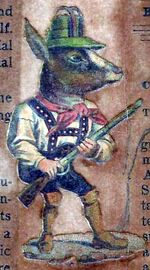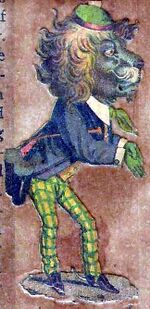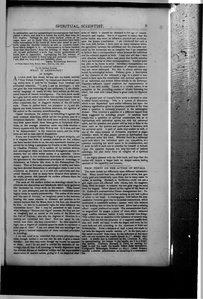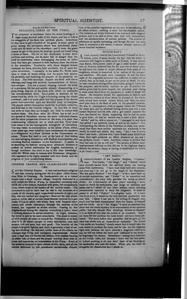< What is Astrology? (continued from page 1-176) >
acter of which it should be divested in this age of reason research and inquiry. Nor is it opposed to reason that the stellar bodies may exert an influence, physical and psychical, upon the human constitution. I am convinced that such is the case, and, further, I have seen so many instances where the agreement between the individual and the character indicated by his horoscope was so complete that I am compelled to believe that a correspondence exists between the individual and the celestial aspects at birth. I may also add that I have seen absolute failures, which may prove that beside celestial there are terrestrial or other correspondences. Another point has also to be borne in mind: hereditary transmissions can only be modified by external influences of whatever nature— they are never destroyed. But this is almost entirely neglected by astrological writers. Ptolemy gives a description of the character of the influence a sign or a planet is supposed to have upon the constitution and external appearance of an individual, and writers follow blindly in his footsteps Planetary influence cannot eradicate the characteristics of race; it can only modify. Casael, to a certain extent, is aa exception to the prevailing custom of blindly following the blind; but even with Casael there is great room for Improvement.
The greater part of Casael's little stork is devoted to what is called horary astrology. This is a system of divination which is not dependent upon stellar influence, but upon the arbitrary signification given to planetary positions at the time when a question is seriously proposed to the astrological diviner. This involves a question of a different import from those suggested by Astrology proper. It resolves itself simply into a question of spiritual communion, not, as in Spiritualism, with individual spirits, but with the universal spirit, and the question and answer will be true or false in the same ratio as the querent and queried are in harmony with the universal spirit. A pack of cards may answer as well, or any of the many systems of divination practiced in pagan worship; much of what passes current as Spiritualism may be embraced under this head. Whether there be a universal spirit with which the individual spirit can sympathize, is a question involving too much space in its consideration, and it must be left to each one to consider for himself or herself Upon this question depends not only the truth of judicial astrology, but also every form of religion of a spiritual character.
I am highly pleased with the little book, and hope that the author will launch a larger bark on deeper waters, fueling assured of his capability and honesty.
Prof. Perty on The Action of Metals
The same metals act differently upon different somnambulists. Many cannot bear iron, others gold or silver, bur generally gold acts beneficially upon them, but in many cases its action is exciting. Bochard, in Heilbronn, could not put a girl, eight years old, affected with chorea, into the magnetic sleep, when he forgot to remove the two gold rings he wore from his fingers. Silver placed on the region of the beset of Dr. Haddock’s somnambulist Emma demagnetized her; Dr. Haddock could not mesmerize her as long as she had a piece of silver on her head. A looking-glass held before the somnambulist Petersen gave rise to muscular contractions, which terminated in spasmodic actions; spasms were alto induced by her holding zinc or iron in her hand. Silver bad a calming effect; copper produced no result The somnambulist Koehler magnetized by passes a piece of steel, which attracted large needles, whereas before it only attracted iron filings This subject was so sensitive to the influence of mineral magnetism, that she felt the presence of a magnetic needle from afar, and could act upon it with the finger, and even by her mere look and will, according to the statement of Bahr and Kohlschulter. From a distance of half a yard, she made by her look the magnetic needle decline 4° to the want, and a like result recurred three times by the influence of her mere will—on one occasion the needle turned to 7°, always westward. A similar fact is confirmed by the Countess R., who, by approximating her breast to the needle, set it in a trembling motion. Prudence Bernard, in Paris, by moving her head to and fro, made the needle follow these movements. (Galignani's Messenger, October 31, 1851.) Count Szapary records a similar phenomenon as occurring in a somnambulist.
"Art Magic"
A correspondent of the London Medium, "Cosmos," says: Two books, “Art Magic” and “Hafed," which have recently issued from the spiritual press, are causing some little controversy. I have read them both with interest, and must say I do not go to the length of the disputants The one party declares “Art Magic” to be a mere hash up of ancient superstition, and “Hafed” to be untruthful and contradictory; the other tide glorifies the works as almost divine. At a Spiritualist of tome years' standing, I have learnt to check my enthusiasm, and judge of mediums and books just as I would of any other matter, never allowing preconceived opinions to warp the judgment. It must be patent to all that “Hafed,” it a singular work. If it were free from error, it would be the only spiritual production that ever was. I fancy I can see in the writing of Duguid very much that has been transplanted from the brains of himself and the circle. As to " Art Magic," it must be admitted that there was too ranch mystery in its annunciation to the spiritual public: but why should Mrs. Hardinge Britten be blamed? It is no fault of hers that the author is so eccentric Had it not been for her services the book would not have been published. The mean fellow who grumbles that he gave £1 for what was worth only 4s. deserves no sympathy. He joined “the noble six hundred,” clearly aware that it would take the sum stated to produce the book, and he has sot the slightest rigid now, because he can't become a magician—that is to say, he will not follow the hard path indicated in the work— he begrudges his money. Sometimes I indulge in a ticket for an Art Union raffle, but because I don't win the first prize, or, indeed anything at all, you don’t hear of me blowing-up the bookseller who sold the ticket. When you do, class me alongside the dissatisfied one I allude to.


A Tap at Mrs. Tappan
...
Editor's notes
- ↑ Prof. Perty on The Action of Metals by unknown author, Spiritual Scientist, v. 5, No. 1, September 6, 1876, p. 9
- ↑ "Art Magic" by unknown author, Spiritual Scientist, v. 5, No. 3, September 21, 1876, p. 27
- ↑ image by unknown author. Donkey-man
- ↑ image by unknown author. Lion-man
- ↑ A Tap at Mrs. Tappan by Olcott, H. S., Banner of Light
Sources
-
Spiritual Scientist, v. 5, No. 1, September 6, 1876, p. 9
-
Spiritual Scientist, v. 5, No. 3, September 21, 1876, p. 27


